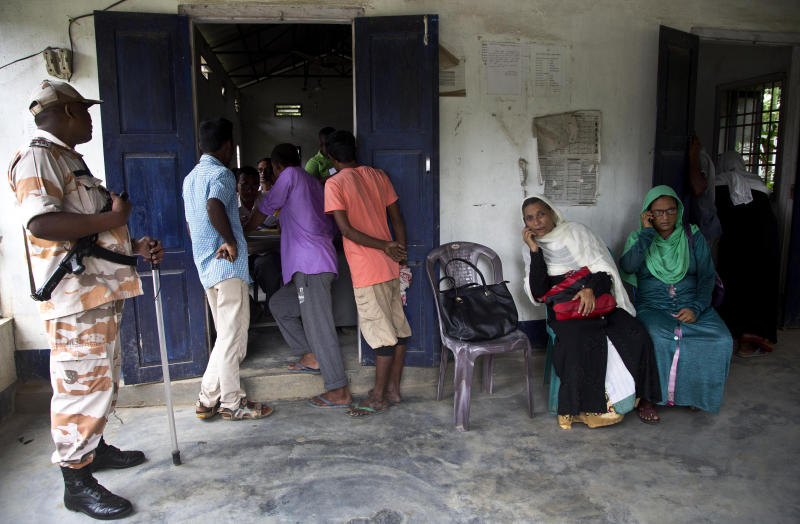India excludes around 1.9 million individuals from registry of citizens in Assam
Sign up now: Get insights on Asia's fast-moving developments

People checking their names in the final list of the National Register of Citizenship at a village in Assam on Aug 31, 2019.
PHOTO: AP
Follow topic:
NEW DELHI - Around 1.9 million residents of the eastern Indian state of Assam are closer to being rendered stateless after being excluded from the final National Register of Citizens (NRC) published on Saturday (August 31).
The four-year exercise, monitored by the Supreme Court, was an attempt to sift undocumented foreign immigrants living in the state from genuine Indian citizens.
Around 33 million residents of Assam, which shares a border with Bangladesh, attempted to prove that they or their ancestors have been living in India prior to March 25, 1971, using documents such as birth certificates, land and tenancy records, government-issued employment or education certificates.
Among those excluded is Mr Ananta Kumar Malo, a member of the local state assembly from an opposition party, All India United Democratic Front.
The cut-off date was drawn from the Assam Accord, an agreement the federal government signed in August 1985 with groups in the state protesting an influx of migrants from Bangladesh. The government had promised in the Accord to detect foreigners who entered the state after this cut-off date and take "practical steps" to "expel" them.
Those left out of the NRC - the exact figure is 1,906,657 - will not be deemed foreigners right away as they still have the opportunity to challenge their exclusion in quasi-judicial bodies called Foreigners Tribunals (FT) that have been given the power to adjudicate claims of Indian citizenship. The deadline to do so has been extended from 60 to 120 days from the list's publication.
If deemed a foreigner by these tribunals, an individual can also take further legal recourse and appeal against its order in the state's High Court and, if required, in the Supreme Court.
Security has been tightened in Assam, with additional paramilitary personnel and police posted across the state to quell any unrest that may arise from the list's publication.
Chief minister Sarbananda Sonowal, who developed his political career as a student leader campaigning against illegal immigration in Assam, uploaded a video statement on Twitter on the eve of the list's publication urging people not to panic and promising legal assistance from the state to those who may need it.
"As long as appeal is there, no one will be treated as foreigners because to declare a person as foreigner is only the authority of the FT," he added.
Those declared foreigners by the tribunals risk being sent to state detention centres. Deportation to Bangladesh is, however, unlikely as the country has not recognised these individuals as its citizens.
India's Minister for External Affairs S Jaishankar on a recent visit to Dhaka even termed the NRC as as an "internal matter".
While more than 100,000 persons have been declared foreigners by these tribunals, a little over 900 are in detention. The others are "untraceable", according to the state government.
There are more than 200 such tribunals in Assam, and their numbers are expected to go up to 1,000 soon so that they can adjudicate on the large number of claims that are expected to be filed now.
While the NRC was seen as an effort that would bring some closure to the longstanding agitation against Bengali-speaking migrants in a state dominated by Assamese speakers, early signs indicate anything but.
The government in Assam, which is led by the Bharatiya Janata Party (BJP), released earlier this month a district-wise split of the figures of those excluded from the NRC. These showed higher rates of inclusion in districts along the border with Bangladesh than in those away from it.
Local BJP leaders have used this data to claim that many illegal Muslim migrants have made it to the NRC with fake documents.
"In districts bordering Bangladesh, like South Salmara and Dhubri, the rate of exclusion is the lowest and in Bhumiputra districts (those considered to have a higher presence of bhumiputras or indigenous people), it's high," Assam's minister for finance, health and family welfare Himanta Biswa Sarma told reporters on Saturday. "How it can be? We are not interested in this NRC anymore."
"NRC is no quarter final, semi-final and final for driving out Bangladeshis...wait a while and you will see more finals under the BJP regime."
The BJP, which is worried that many Hindu migrants who entered Assam before the cut-off date have been left out, had even sought to have the NRC data reverified before the publication of the final list. The Supreme Court turned down this request.
Mr Sonowal has since then suggested that a decision to challenge the final NRC through a legislative route could be discussed in future.
Meanwhile, those excluded have begun preparing for the legal battle that lies ahead.
Ms Syeda Tanuja Hussain, a 33-year-old school teacher in the state capital of Guwahati, was left out from the list, while her father, mother and brother made the cut.
"The NRC authorities had a problem with my birth certificate because it was issued two years after my birth, which led them to question if I was adopted," she told The Straits Times.
"As many as ten of my immediate and extended family members, who had made it to the earlier draft list, were present as witnesses for me when I appeared for my NRC hearing. I really can't understand why my name has not been included. It is just sheer harassment that is now going to throw daily life out of gear," she said.

